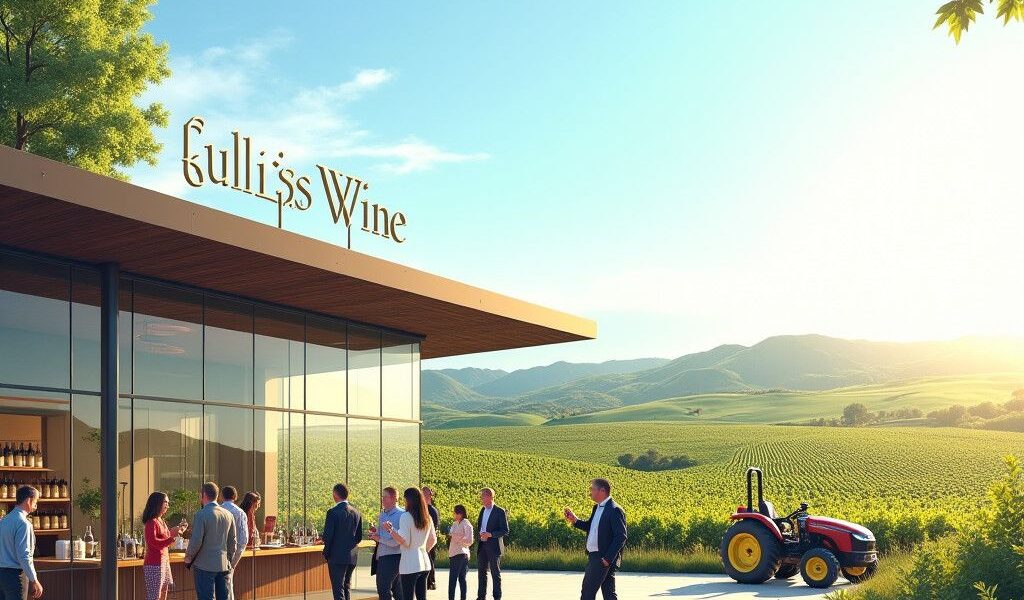Full Glass Wine Co. Strengthens Direct-to-Consumer Presence with Strategic Acquisitions
Full Glass Wine Co. is gaining significant traction in the direct-to-consumer (DTC) wine market through its recent acquisitions of Wine Access and Cameron Hughes Wine. These additions, announced this week, mark a pivotal moment for the company as it integrates the latest brands into its growing portfolio. This move represents the sixth and seventh acquisitions in just 17 months, solidifying Full Glass’s role as a leading figure in DTC wine sales, which have become increasingly relevant in today’s market.
By focusing on direct sales through online platforms, Full Glass and its brands effectively eliminate traditional retail and wholesale channels. This approach not only offers consumers a wider variety of wine options, but also includes benefits such as subscription plans, customizable wine cases, and personalized recommendations. These features are powered by advanced analytics and artificial intelligence, catering to the evolving preferences of wine enthusiasts. Moreover, the added convenience of free shipping and direct-to-door delivery has made purchasing wine online more appealing than ever.
The ambitious growth trajectory projected by Full Glass is compelling. With an aim to exceed $200 million in revenue by the end of 2025, the company is well-positioned for continued success. Since its launch, Full Glass has quickly made significant strides, acquiring seven notable DTC wine brands, including Winc, Bright Cellars, Wine Insiders, Scout & Cellar, and Splash Wines. Each of these brands offers unique features that attract consumers, especially the younger and more diverse demographics that are currently underrepresented in the wine market.
The masterminds behind Full Glass’s expansion—co-founders Neha Kumar and Louis Amoroso—are capitalizing on trends and changes in consumer behavior spurred by the pandemic. The rise of online wine purchasing during this period greatly increased demand, but as the post-pandemic landscape unfolded, many brands faced financial challenges. Full Glass has expertly navigated this environment by acquiring struggling brands while preserving their distinct identities. Kumar, who serves as the chief operating officer, underscores this approach, stating, “We look for brands that bring a strong history of quality, expertise in wine discovery, and proven consumer loyalty.”
Last year, Full Glass took a significant step forward by raising $14 million in a Series A funding round, capitalizing on the growing interest in DTC wine sales and positioning itself for further expansion. Kumar has indicated that the company expects to achieve a revenue run rate of $100 million by the end of this year, with intentions to close another funding round in the first half of 2025.
The recent acquisitions of Wine Access and Cameron Hughes Wine stand to enrich Full Glass’s offerings. For instance, Winc’s subscription model employs a “Palate Profile” quiz, allowing users to receive personalized wine recommendations tailored to their tastes. Customers are encouraged to rate their selected wines afterward, ensuring that future recommendations are even more aligned with their preferences. This interactive experience has proven to be a popular feature among new wine drinkers.
The DTC wine market has experienced a notable stabilization following its pandemic-induced growth. According to WineBusiness Analytics and Sovos ShipCompliant, the total shipment value reached $4.14 billion in 2023. While shipment volume saw a decline of 6.5% year-over-year, the overall value remains significantly higher than pre-pandemic levels. In fact, DTC wine sales accounted for approximately 5% of total U.S. wine sales in 2023, marking this segment as one of the most resilient in the industry.
Another trend driving growth in the DTC market is the increasing demand for higher-priced wines. In 2023, wines priced over $50 showcased gains in value and volume, indicating a shift in consumer preferences toward premium offerings. Looking ahead, the 2024 Silicon Valley Bank Wine Report forecasts modest growth for DTC wine sales, suggesting that the positive trend is expected to persist into 2025.
In summary, Full Glass Wine Co. is strategically enhancing its position in the competitive DTC wine market through well-timed acquisitions and a keen focus on operational efficiencies. With a diverse portfolio of brands appealing to younger consumers, Full Glass is not only meeting current market demands but also shaping the future of wine consumption through modern technology and customer engagement practices. As the landscape continues to evolve, Full Glass is poised to remain a crucial player in the direct-to-consumer space.












